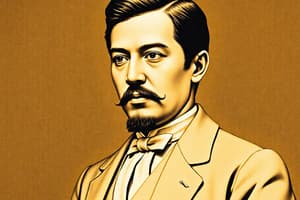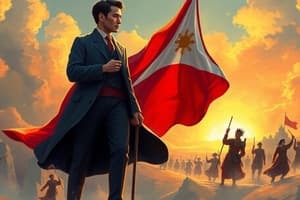Podcast
Questions and Answers
Jose Rizal was born on June 19, 1861, in ______, Laguna, Philippines.
Jose Rizal was born on June 19, 1861, in ______, Laguna, Philippines.
Calamba
Rizal wrote a novel titled ______, which exposed social injustices in the Philippines.
Rizal wrote a novel titled ______, which exposed social injustices in the Philippines.
Noli Me Tangere
In 1892, Rizal founded ______ to promote reforms and unify Filipinos.
In 1892, Rizal founded ______ to promote reforms and unify Filipinos.
La Liga Filipina
Rizal was executed by firing squad on December 30, 1896, in ______.
Rizal was executed by firing squad on December 30, 1896, in ______.
Rizal advocated for peaceful reform rather than ______ revolution.
Rizal advocated for peaceful reform rather than ______ revolution.
Flashcards are hidden until you start studying
Study Notes
Life of Jose Rizal
- Born on June 19, 1861, in Calamba, Laguna, Philippines.
- Educated in Manila and later in Europe (Spain, France, and Germany).
- Known as a nationalist, writer, and reformist.
Key Works
- Noli Me Tangere (1887): Novel exposing the social injustices in the Philippines under Spanish colonial rule.
- El Filibusterismo (1891): Sequel to Noli Me Tangere; a more revolutionary call against oppression.
- La Liga Filipina: Founded in 1892 to promote reforms and unify Filipinos.
Contributions to Philippine Nationalism
- Advocated for peaceful reform rather than violent revolution.
- Championed education, rights, and liberties of Filipinos.
- His writings inspired future leaders of the Philippine revolution.
Exile and Death
- Exiled to Dapitan from 1892 to 1896 for opposing the Spanish government.
- Arrested in 1896 for charges of sedition and rebellion.
- Executed by firing squad on December 30, 1896, in Bagumbayan (now Rizal Park).
Legacy
- National Hero of the Philippines; his birthday is celebrated as Rizal Day.
- Monumental contributions to Philippine literature and nationalism.
- Rizal's life and works continue to influence Filipino identity and patriotism.
Notable Themes in His Works
- Social injustice and corruption.
- The importance of education and enlightenment.
- National identity and the struggles against colonialism.
Life
- Jose Rizal was born on June 19, 1861, in Calamba, Laguna, Philippines.
- He was educated in Manila and later studied in Europe, specifically in Spain, France, and Germany.
- He was a Filipino nationalist, writer, and reformist.
Writings
- Noli Me Tangere was published in 1887. It is a novel that exposed social injustices in the Philippines under Spanish colonial rule.
- El Filibusterismo, published in 1891, is the sequel to Noli Me Tangere. It's considered a strong call for revolution against oppression.
La Liga Filipina
- Founded in 1892
- Promoted reforms and aimed to unify Filipinos
Philippine Nationalism
- Jose Rizal was a strong advocate for peaceful reforms over violent revolution.
- He championed education, rights, and liberties for Filipinos.
- His writings were influential, motivating future leaders of the Philippine Revolution.
Exile and Death
- Jose Rizal faced exile in Dapitan from 1892 to 1896 due to his opposition to the Spanish government.
- He was arrested in 1896 and charged with sedition and rebellion.
- His execution by firing squad took place on December 30, 1896, in Bagumbayan (now Rizal Park).
Legacy
- He has been named a national hero of the Philippines.
- Rizal Day celebrates his birthday.
- He made immense contributions to Philippine literature and nationalism.
- His works and his life continue to influence Filipino identity and patriotism.
Themes
- Social injustice and corruption are prominent themes in his work.
- He emphasizes the importance of education and enlightenment.
- National identity and the struggles against colonialism are central to his writings.
Studying That Suits You
Use AI to generate personalized quizzes and flashcards to suit your learning preferences.




